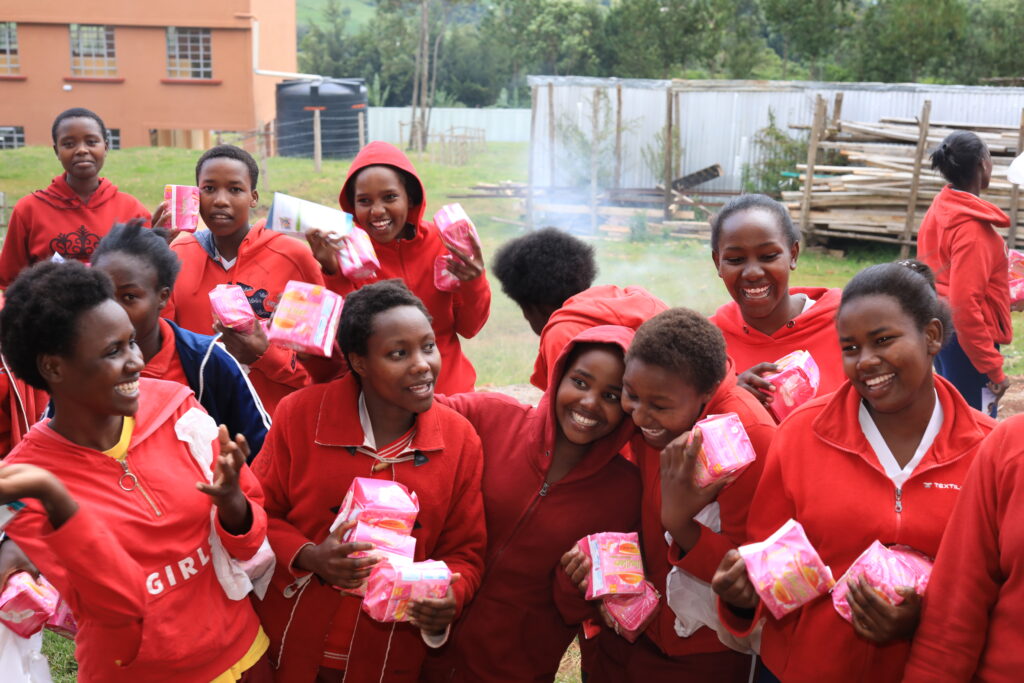Today is Menstrual Hygiene Day, and this year’s theme is “making menstruation a normal fact of life by 2030.” At Kakenya’s Dream, we’re promoting menstrual health and bringing attention to an issue that quietly endangers millions of girls around the world: period poverty.
Period poverty is defined as the lack of access to adequate menstrual hygiene products, bathroom facilities, and reproductive health education. Of the approximate 1.9 billion people around the world who menstruate, an estimated 500 million — about 1 in 4 — experience period poverty.
While period poverty is a global problem, it disproportionately impacts women and girls in low-income countries, where commercial hygiene products, sanitary facilities, and sexual health education are less accessible. In Kenya, for example, one study finds that 65% of women and girls are unable to afford sanitary pads. And even when girls do have access to sanitary pads, many are unable to use them because they may not own underwear.
Period poverty is not just an inconvenience — it has serious, long-term consequences for girls’ health and well-being. On the one hand, it forces many girls to resort to unsanitary alternatives to pads (such as rags, tissue paper, and wool), which leaves them vulnerable to infections and, in extreme cases, infertility. Infections are even more likely for those who have been subjected to female genital mutilation (FGM), which affects 66% of girls and women in the communities we serve.
On the other hand, period poverty interrupts a girl’s public life. A lack of adequate/private bathroom facilities and period products, paired with taboos and shame surrounding menstruation, forces many girls to stay home from school or work while on their period. According to UNESCO, 1 in 10 girls in sub-Saharan Africa misses school during her menstrual cycle, which equates to 20% of the school year.
At Kakenya’s Dream, no girl experiences the pain of period poverty.

First and foremost, we provide every student at our Centers for Excellence (KCE I and II) with sanitary pads, underwear, and safe, private hygiene facilities. Since 2017, we’ve distributed 27,356 packs of sanitary pads to the girls in our programs and occasionally, their siblings and other family members too. This academic term, we are planning to give out an additional 11,240 pads and 5,520 pairs of underwear. These products promote the dignity and health of girls, which in turn improves their overall school performance: one study conducted in Kenya, for example, found that providing sanitary pads reduced school absenteeism by 5%.
Just as important, we address the underlying attitudes that perpetuate period poverty in the first place. Due to cultural stigmas, only 50% of girls in Kenya report openly discussing menstruation at home. Through our community outreach programs, we’re working to end the stigma by fostering open communication to help make menstruation a normal fact of life.
First, our Health and Leadership Trainings engage our students, as well as boys and girls from partner schools across the region, with weekly educational workshops on gender equality, bodily autonomy, and sexual and reproductive health. This provides girls with critical information about menstrual hygiene, and in the process, it helps demystify menstruation for boys, most of whom have never received a comprehensive sexual education. These trainings have reached nearly 25,000 students across 132 schools to date, cultivating a generation that is both aware of and sympathetic to girls’ menstrual needs.
Second, our Linda Dada campaign (which means “protect a sister” is Swahili) assembles community stakeholders (such as government officials, religious leaders, and parents) and provides a platform to openly discuss a range of sexual and reproductive health issues that are considered taboo, menstruation being one of them. This accelerates behavioral change and builds community support for long-term, structural reform. The Linda Dada campaign has reached over 3,000 community members directly, as well as an additional 325,000 via educational radio and television programming.
You can help support this work today. At our Menstrual Hygiene Day event this week, we’re giving out 600 pairs of underwear and 600 packs of sanitary pads. For just $15, you can provide 20 packs of sanitary pads and underwear to girls in need. Make your donation here.

